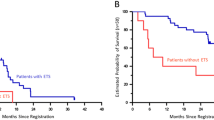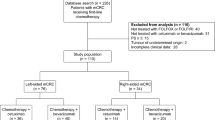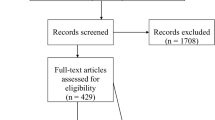Abstract
Objectives
Early tumor shrinkage (ETS) has been reported to be associated with survival of metastatic colorectal cancer (mCRC) patients. Our aim was to analyze long-term tumor-size evolution, according to early mCRC best responses during the first-line therapy, to evaluate first best response-survival links.
Methods
Sixty-five patients with unresectable mCRCs, treated between 2010 and 2015, were included retrospectively in this descriptive monocenter study and grouped according to their RECIST 1.1 first-line best responses: progressive disease (PDfl), stable disease with tumor-size evolution between 0 and + 19% (SDfl+) or 0 and − 29% (SDfl–), and partial responders (PRs), who were classed PR with ETS (ETSfl) or without (PRfl). Tumor-size evolution and best tumor responses to each chemotherapy line were analyzed.
Results
Tumor loads of ETSfl or PRfl mCRCs tended to remain inferior to their initial values: 60% of patients died with target lesion sums below baseline. For first-line SDfl+ or PDfl mCRCs, rapid tumor load increases continued during successive lines: > 80% died with target lesion sums above baseline. ETSfl mCRCs responded better to subsequent lines (37.5% second-line PR), whereas PDfl mCRCs remained refractory to other therapies (0% second- and third-line PR). Overall survival rates were significantly (p = 0.03) longer for the ETSfl group (29.9 [95% CI: 12.6–47.1] months) and shorter for the PDfl group (17.1 [95% CI: 1.5–37.5] months).
Conclusion
Tumors responding to first-line chemotherapy also responded better to subsequent lines, whereas PDfl mCRCs remained refractory, which may explain the better survival associated with ETSfl.
Key Points
• Early shrinking tumors under first-line chemotherapy responded better to subsequent lines, maintaining low tumor loads, potentially explaining the link between early tumor shrinkage and overall survival of metastatic colorectal cancer (mCRC) patients.
• mCRCs progressing under first-line chemotherapy remained refractory to other therapies and their tumor loads increased rapidly.
• Even outside a clinical trial, an early first CT scan reevaluation with RECIST criteria 8 weeks after starting first-line therapy is crucial to determine long-term mCRC evolution.




Similar content being viewed by others
Abbreviations
- CT:
-
Computed tomography
- EGFR:
-
Epidermal growth factor receptor
- ETS:
-
Early tumor shrinkage
- ETSfl :
-
Early tumor shrinkage at first line (defined at 8 weeks)
- fl:
-
First line
- mCRC:
-
Metastatic colorectal cancer
- OS:
-
Overall survival
- PD:
-
Progressive disease
- PDfl :
-
Progressive disease at first line
- PFS:
-
Progression-free survival
- PR:
-
Partial response
- PRfl :
-
Partial response at first line (without ETSfl: delayed response)
- RECIST:
-
Response evaluation criteria in solid tumors
- Sd:
-
Stable disease
- SDfl :
-
Stable disease at first line
References
Cremolini C, Loupakis F, Antoniotti C et al (2015) FOLFOXIRI plus bevacizumab versus FOLFIRI plus bevacizumab as first-line treatment of patients with metastatic colorectal cancer: updated overall survival and molecular subgroup analyses of the open-label, phase 3 TRIBE study. Lancet Oncol 16:1306–1315
Schwartzberg LS, Rivera F, Karthaus M et al (2014) PEAK: a randomized, multicenter phase II study of panitumumab plus modified fluorouracil, leucovorin, and oxaliplatin (mFOLFOX6) or bevacizumab plus mFOLFOX6 in patients with previously untreated, unresectable, wild-type KRAS exon 2 metastatic colorectal cancer. J Clin Oncol 32:2240–2247
Heinemann V, von Weikersthal LF, Decker T et al (2014) FOLFIRI plus cetuximab versus FOLFIRI plus bevacizumab as first-line treatment for patients with metastatic colorectal cancer (FIRE-3): a randomised, open-label, phase 3 trial. Lancet Oncol 15:1065–1075
Venook AP, Niedzwiecki D, Lenz HJ et al (2017) Effect of first-line chemotherapy combined with cetuximab or bevacizumab on overall survival in patients with KRAS wild-type advanced or metastatic colorectal cancer: a randomized clinical trial. JAMA 317:2392–2401
Van Cutsem E, Cervantes A, Adam R et al (2016) ESMO consensus guidelines for the management of patients with metastatic colorectal cancer. Ann Oncol 27:1386–1422
Eisenhauer EA, Therasse P, Bogaerts J et al (2009) New response evaluation criteria in solid tumours: revised RECIST guideline (version 1.1). Eur J Cancer 45:228–247
Venook AP, Tabernero J (2015) Progression-free survival: helpful biomarker or clinically meaningless end point? J Clin Oncol 33:4–6
Claret L, Gupta M, Han K et al (2013) Evaluation of tumor-size response metrics to predict overall survival in western and Chinese patients with first-line metastatic colorectal cancer. J Clin Oncol 31:2110–2114
Stintzing S, Modest DP, Rossius L et al (2016) FOLFIRI plus cetuximab versus FOLFIRI plus bevacizumab for metastatic colorectal cancer (FIRE-3): a post-hoc analysis of tumour dynamics in the final RAS wild-type subgroup of this randomised open-label phase 3 trial. Lancet Oncol 17:1426–1434
Piessevaux H, Buyse M, De Roock W et al (2009) Radiological tumor size decrease at week 6 is a potent predictor of outcome in chemorefractory metastatic colorectal cancer treated with cetuximab (BOND trial). Ann Oncol 20:1375–1382
Suzuki C, Blomqvist L, Sundin A et al (2012) The initial change in tumor size predicts response and survival in patients with metastatic colorectal cancer treated with combination chemotherapy. Ann Oncol 23:948–954
Heinemann V, Stintzing S, Modest DP, Giessen-Jung C, Michl M, Mansmann UR (2015) Early tumour shrinkage (ETS) and depth of response (DpR) in the treatment of patients with metastatic colorectal cancer (mCRC). Eur J Cancer 51:1927–1936
Piessevaux H, Buyse M, Schlichting M et al (2013) Use of early tumor shrinkage to predict long-term outcome in metastatic colorectal cancer treated with cetuximab. J Clin Oncol 31(30):3764–3775
Cremolini C, Loupakis F, Antoniotti C et al (2015) Early tumor shrinkage and depth of response predict long-term outcome in metastatic colorectal cancer patients treated with first-line chemotherapy plus bevacizumab: results from phase III TRIBE trial by the Gruppo Oncologico del Nord Ovest. Ann Oncol 26:1188–1194
Douillard JY, Siena S, Peeters M, Koukakis R, Terwey JH, Tabernero J (2015) Impact of early tumour shrinkage and resection on outcomes in patients with wild-type RAS metastatic colorectal cancer. Eur J Cancer 51:1231–1242
Giessen C, Laubender RP, Fischer von Weikersthal L et al (2013) Early tumor shrinkage in metastatic colorectal cancer: retrospective analysis from an irinotecan-based randomized first-line trial. Cancer Sci 104:718–724
Modest DP, Laubender RP, Stintzing S et al (2013) Early tumor shrinkage in patients with metastatic colorectal cancer receiving first-line treatment with cetuximab combined with either CAPIRI or CAPOX: an analysis of the German AIO KRK 0104 trial. Acta Oncol 52:956–962
Petrelli F, Pietrantonio F, Cremolini C et al (2015) Early tumour shrinkage as a prognostic factor and surrogate end-point in colorectal cancer: a systematic review and pooled-analysis. Eur J Cancer 51:800–807
Therasse P, Arbuck SG, Eisenhauer EA et al (2000) New guidelines to evaluate the response to treatment in solid tumors. J Natl Cancer Inst 92:205–216
Tsuji A, Sunakawa Y, Ichikawa W et al (2016) Early tumor shrinkage and depth of response as predictors of favorable treatment outcomes in patients with metastatic colorectal cancer treated with FOLFOX plus cetuximab (JACCRO CC-05). Target Oncol 11:799–806
Rivera F, Karthaus M, Hecht JR et al (2017) Final analysis of the randomised PEAK trial: overall survival and tumour responses during first-line treatment with mFOLFOX6 plus either panitumumab or bevacizumab in patients with metastatic colorectal carcinoma. Int J Colorectal Dis 32:1179–1190
Tie J, Kinde I, Wang Y et al (2015) Circulating tumor DNA as an early marker of therapeutic response in patients with metastatic colorectal cancer. Ann Oncol 26:1715–1722
Garlan F, Laurent-Puig P, Sefrioui D et al (2017) Early evaluation of circulating tumor DNA as marker of therapeutic efficacy in metastatic colorectal cancer patients (PLACOL study). Clin Cancer Res. https://doi.org/10.1158/1078-0432.CCR-16-3155
Funding
The authors state that this work has not received any funding.
Author information
Authors and Affiliations
Corresponding author
Ethics declarations
Guarantor
The scientific guarantor of this publication is Prof. Olivier Lucidarme.
Conflict of interest
The authors of this manuscript declare no relationships with any companies whose products or services may be related to the subject matter of the article.
Statistics and biometry
One of the authors has significant statistical expertise. And no complex statistical methods were necessary for this paper.
Informed consent
Written informed consent was not required for this study because it is a retrospective study.
Ethical approval
Institutional Review Board approval was not required because it was a retrospective study.
Methodology
• retrospective
• observational
• performed at one institution
Additional information
Publisher’s note
Springer Nature remains neutral with regard to jurisdictional claims in published maps and institutional affiliations.
Electronic supplementary material
ESM 1
(DOCX 22 kb)
Rights and permissions
About this article
Cite this article
Palmieri, LJ., Fihri, A., Doat, S. et al. Tumor-size responses to first-line is a predictor of overall survival in metastatic colorectal cancer. Eur Radiol 29, 3871–3880 (2019). https://doi.org/10.1007/s00330-018-5967-0
Received:
Revised:
Accepted:
Published:
Issue Date:
DOI: https://doi.org/10.1007/s00330-018-5967-0




